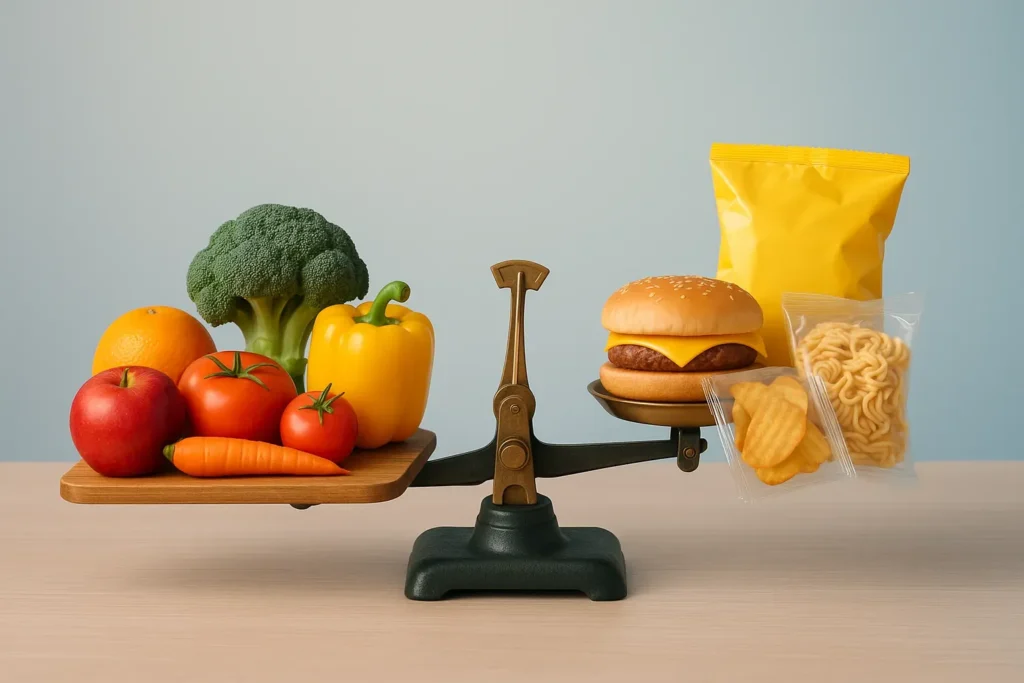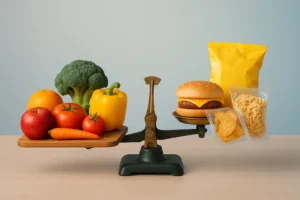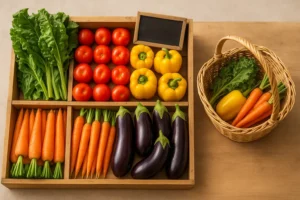Breaking the cycle of unhealthy eating habits can be challenging in today’s fast-paced world. Leading nutrition and health experts offer practical strategies to help resist the temptation of cheap, processed foods. Their insights include meal preparation techniques, grocery shopping discipline, and creating healthier alternatives to satisfy cravings.
- Shop the Perimeter for Whole Foods
- Create Flavor With Quality Ingredients
- Pre-Decide With Default Healthy Food Swaps
- Invest in Meal Prep for Long-Term Health
- Prepare Meals and Pack Healthy Snacks
- Practice Discipline at the Grocery Store
Shop the Perimeter for Whole Foods
I find that preparation is key to avoiding the temptation of processed foods when grocery shopping. Having a nutritious snack before shopping prevents impulse purchases driven by hunger, while creating a list focused on whole foods helps me stick to healthier options. Shopping primarily around the store’s perimeter where fresh produce, lean proteins, and dairy are located naturally steers me away from the processed items typically found in center aisles. When temptation strikes, I practice a quick body check-in to determine if my choices are driven by true hunger or just emotional cravings.

Create Flavor With Quality Ingredients
At Block & Rooster Provisions, we don’t resist temptation by avoiding flavor—we redefine it. Processed foods may look cheaper in the moment, but the true cost comes later in energy, health, and overall quality of life.
Our strategy is simple: invest in ingredients that speak for themselves. Seasonal produce, quality proteins, and thoughtfully sourced grains deliver flavor and nutrition in ways no boxed option can. A perfectly roasted carrot or a seared piece of fish with nothing more than salt, pepper, and lemon will always outshine something processed.
Convenience is often what makes unhealthy food appealing, so we counter that with preparation. Keeping fruit washed and ready, vegetables cut, grains cooked, or chicken roasted ahead ensures the better choice is always within reach. It’s less about willpower and more about creating the right environment.
We also respect indulgence. Desserts and richer dishes have their place when they’re crafted with intention. A handmade dessert using real butter, fresh eggs, and quality chocolate satisfies in a way no processed snack can—because it’s made with honesty.
The real strategy is shifting perspective. Instead of comparing the cost of chips to a basket of vegetables, look at the return. A wholesome meal fuels tomorrow, sharpens focus, and creates memories around the table. Processed food may save a few dollars, but true nourishment sustains both body and spirit—and that’s always worth the investment.

Pre-Decide With Default Healthy Food Swaps
This is such a challenge since processed foods are made to be cheap, convenient, and crave-worthy. One strategy that works well for me is to pre-decide with “Default Swaps.” Rather than fighting temptation in the moment, set up automatic swaps when shopping. For example, instead of chips I buy air-popped popcorn or roasted chickpeas, instead of soda I stock up on flavored sparkling water, and instead of candy, I keep frozen grapes or dark chocolate squares. Bringing these swaps home allows a change in the food environment, and I can go for the healthier options in my pantry when I need a snack without derailing my goals or feeling guilty. This works by reducing decision fatigue, still satisfying reward pathways in the brain without the heavy cost of processed foods, and saves money over time since bulk-buying whole foods or simple snacks stretches further than repeated purchases of single snacks.

Invest in Meal Prep for Long-Term Health
The secret to staying away from unhealthy processed foods is planning and attitude. One of the best ways to do this is to ensure that you meal prep. I dedicate a couple of hours a week to cooking healthy meals. This ensures that I have healthy homemade alternatives available to me so that I will be less inclined to go for the fast, cheap option. When meals are pre-prepared, it is easier to choose the right one without having to resort to processed foods.
I think about how good nutrition pays off in the long run. Sure, processed foods may be the cheaper option in the short run, but I know the cost of poor health down the road can be a lot higher. When I reach for whole foods, I’m not only investing in my body, I’m investing in myself. So, although there may be a small price difference between healthy options and less healthy ones, from a health perspective, I consider it money well spent.

Prepare Meals and Pack Healthy Snacks
With a busy lifestyle, it is very easy to get tempted by processed foods, not only because they are cheaper but also because you don’t have to cook them—it saves time.
Since I started my wellness and fitness journey, good nutrition is a fundamental aspect of my new habits. What I do is try to eat at home before going out so I don’t get hungry. In my day-to-day, I have my meals prepared and packed in advance. I just have to pick one up and go to work, and I have healthy snacks at home and in my bag: protein bars, fruits, or nuts. These simple strategies keep me away from unhealthy foods.

Practice Discipline at the Grocery Store
One simple thing I do to help myself make good choices is practice discipline at the grocery store. If I can stick to healthy foods while I’m there, I’ll have far fewer opportunities to go for processed foods when I’m really craving them, like at the end of a long work week.












